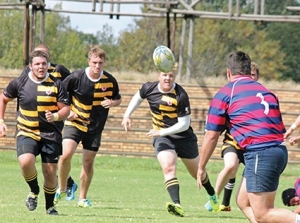Rugby & Rehabilitation: UNICEF Announces Upcoming Film on Child Prisoners
UNICEF Georgia this week revealed the production of a movie called ‘Negative Numbers’ about the rehabilitation of teenagers in prison through sport. The shooting is to begin in September at the old Tbilisi state prison and has been financed by the Georgian National Film Center and by French and UK producers.
“Negative Numbers” is based on the true story of a juvenile detention center in Tbilisi where two ex-professional rugby players took up the challenge to help these young offenders by bringing rugby into the center. In the film, a young prisoner is instructed by his brother to start a riot inside the center, as it destroys the chances of the young people playing their first rugby match, which would lead to more games outside the prison. This dilemma between loyalty to his brother and rugby, as an allegory for liberty, makes the young Nica change his mentality, because the riot would make it impossible for the team to win the game, the precondition before playing outside.
The experience that inspired the movie was set up in 2011 with the initiative of UNICEF together with the Ministry of Corrections and the Georgian Rugby Union. It involved two Georgian professional players, Nodar Andguladze and Lexo Gugava, helping 60 young offenders aged between 14 and 18 years old to reintegrate into society by giving them rugby lessons and sharing experiences. “There can be different solutions for these children. Putting them in prison is one, but it is the worst,” explained Renate Winter, Chair of the UN Committee on the Rights of the Child, adding that school can be another solution.
However, a restorative approach by sport enables the teaching of common values like respect and solidarity. Sport puts the children constantly inside a team, where everybody is equally responsible and shares the same values. “A team is like one fist,” said Lexo Gugava, explaining that goals, successes and mistakes are not the responsibility of an individual, but of the whole team. Even if they lose, they have to congratulate the other team. Accepting the rules can be difficult for children that have long been outside the law. “Sport, and especially rugby, is a very powerful vector for them to understand responsibility and respect, because it emphasizes the importance of others,” explains Nodar Andguladze. Besides, Rugby has a special place in Georgian society and many of the children continued playing rugby after they left the establishment.
What the organizers of the program insist on is that these children were not wrong at all, that they were talented people who simply needed help to get back on the right track. Too long neglected by adults, this ignorance crushed them somehow while traveling their life path. Within this experience they had the possibility to express and share their problems, which was also lived as a deep human experience for the two professional players.
It is this experience UNICEF wants to promote in the movie they are supporting. Indeed, many children in Georgia would benefit from such alternative solutions and the organization hopes the film will inspire the government and NGOs to set up experiences in the same design. Beside this, UNICEF still strongly supports a revision to the legislation to bring children’s rights in line with international standards, offering an improved environment for children in the justice system, the development of specialized justice professionals and the education of children in conflict with the law.
David Mongazon












